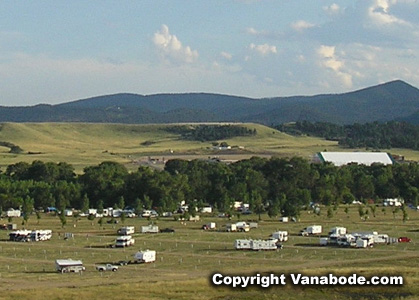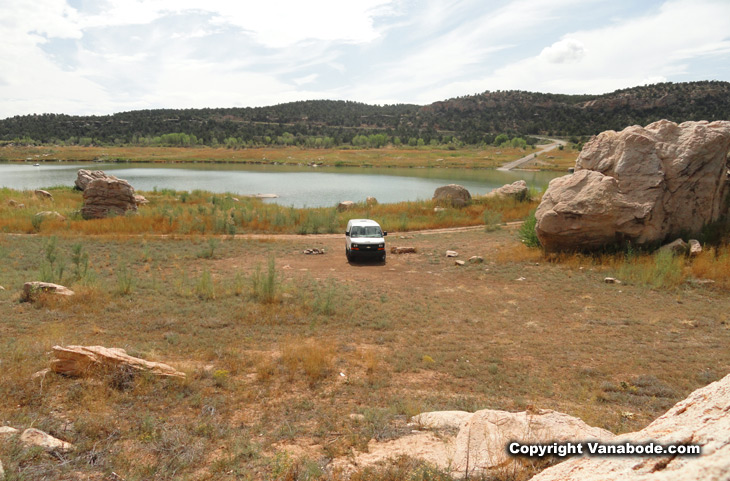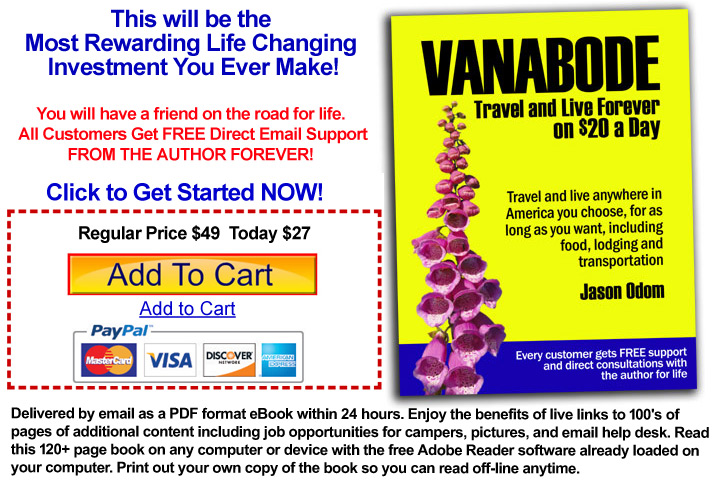
Overview Who Needs This? Excerpts Order Book Pictures Chapters
Answers Reviews Destinations Free Stuff More Contact Us
This page I wrote for my old rv website RVforSaleGuide.com before developing the Vanabode as the best travel vehicle for cheap easy long term road trips. People still like big rv's despite the much greater cost and trouble to operate, so here's what I know about them.
RV Campground for Sale
This RV campground for sale article shows advantages and disadvantages of owning an RV park. If you want to purchase just one piece of rv real estate for one RV go here instead. RV campground for sale sign caught your eye? I'm sure you have a plethora of good ideas that you would incorporate in your campground, as almost every campground owner has had a similar experience. It's tough to run a business, even one that appears to be fun such as a campground. Contrary to what you may perceive, it is a 24 hour a day job 12 months a year. There may be an off season but insurance, marketing, repairs, and government regulations continue. You could attend a convention for campground owners which many invite potential owners. Also, talk to campground owners and take note of what works and what doesn't.

The success of this business is you. The question on your mind should be, "what do I need?" and "what do I bring to the table?" You need all the talents of a major business or you have to get them. Are you a critical thinker? Are you a creative thinker? Do you or your partners have skills that will be valuable in this business? Do you have the discipline to budget? Do you have what it takes to handle the uncertainty of running a small business? How much risk tolerance do you have? Does your personal life fit in the mix? You will never find the perfect campground as every campground has some problem. You should have some specific requirements in mind when you start considering buying a campground. It could be the area you want to buy, the size, the home or the property.
How important is location to you? The buyer should contact the zoning and planning departments of both the county and city governments. Also visit a banking institution in the area who knows commercial real estate better than the banker who makes the loans. Do you want to be near an attraction to assure continued business? This means you are obligated to that attraction for your success or failure. And, with a major attraction there will be more competition. Ahh, imagine a country setting away from attractions providing a camping experience that is serene and captivating with no road noise. But this will be though as you will be generating your business. What about a lake or other body of water? Some successful campgrounds don't even have a pool. Or, maybe you don’t care where it is as long as you can see a profit.
Gathering information You need to obtain income and expenses for the past three years. Off the books income. Substantial gains or losses. The competition. Check on liens, business licenses, sales tax and employer requirements. Unemployment and Workers' Compensation. Get an environmental assessment of the property. Make sure the property is in compliance with state and federal requirements. Additional expenses may be incurred due to a change in ownership. What makes this property unique and an opportunity? When was it built? What improvements were made and when? The contract for sale and purchase. A business plan, convincing the bank. Closing process. Dealing with attorneys and accountants.
Allocation of purchase price What is Allocation? When you buy a campground you are buying many things. These include the land, buildings, equipment, the customers and their addresses/records, and software that runs the registration program. Why allocate? 1) Closing costs. Many states require payment of fees based on the real estate sale. You can separate the land from other items, reducing these fees. 2) Establishment of the depreciation schedule. Buildings (long-term write off) and equipment (short-term write-off) can be depreciated. The land can not be depreciated.
Determining the profit of a campground Profitability is difficult to measure but here are four steps to help. 1) Adjustments to the tax return - a campground tax return will never give an accurate answer to profitability. Generally, there are seven adjustments to be made on the tax return. 2) Non-cash benefits - estimate the value of housing, utilities, insurance and other perks. 3) Tax benefits - possible tax free salary, profit and benefits, possible tax refund the first two years in business, and possibly pay less tax through capital gains (upon sale). These tax breaks significantly change an owner's profitability and his anticipated return on investment. 4) Future value - equity build up. What could the campground be worth in three years or right now? Generally as a business increases the value increases.
Arriving at a price for the campground The goal: Both parties should arrive at a price that is reasonable and based on rational thought. The buyer has to be realistic with his finances; a down payment is the first limitation. The seller has needs like taxes and a new home. Both parties should look at comparable sales and use this as a starting point, look at the campground at hand and come to a price, also look at the future and not the past of the campground. Some sellers have put their heart, sweat, and tears into the campground and want to be paid for this. Some take specifics about real estate sales in the area and apply it to their campground. Some compare their campground with another that just sold. Some make a judgment without much of the key factors that go into arriving at a price, such as income, bottom line, and problems unseen in the park. The buyer needs to look at what has recently been sold and what is currently on the market. The campgrounds year-end statement and tax return to better estimate the actual profit. Look at recent park sales to see how the park compares. Look at basic information about campground businesses that are currently on the market. And, what the competition would be if you put your park on the market.
What parks have sold for Everyone wants to know how much a park is worth. How do you compare the bits and pieces regarding the park you are considering buying? Here is some help. Down Payment as a % to Sales Price, Average Gross Income Multiplier (GIM): The income multiplier is calculated by dividing the actual price of the campground by the reported gross income. Gross Profit Multiplier (GPM): Gross profit is gross income minus cost of goods sold. This multiplier is calculated by dividing the sales price of the campground by the gross profit. This multiplier is similar to the Gross Income Multiplier, but eliminates cost of sales. This can be more accurate in the case of a campground with a large convenience store or gas sales, etc. Price Per Site (PPS): This is what parks have sold for on a price per site basis. Gross Income Per Site (GPS): This measures gross income on a per site basis. This is calculated by dividing the total gross income of each campground by the total number of designated sites. Parks with gross incomes categories: Less than $125,000. Between $125,001 to $300,000. Between $300,001 to $600,00. Greater than $600,000.
Sorted by Gross Income: All Parks
1. % Down payment to Sales Price ?
2. Gross Income Multiplier ?
3. Gross Profit Multiplier ?
4. Price Per Site ?
5. Gross Income per Site ?
Expenses of campgrounds What do campgrounds spend on average for payroll, insurance, advertising,
repair/maintenance, etc.? The following is a list of expenses to consider. Cost of goods, adjusted operating
expenses, accounting/legal, advertising, automobiles, insurance, office expense, payroll (not owner's),
repairs/maintenance, supplies, taxes, utilities, other (bank fees, travel, royalties, dues, licenses,
etc.), total adjusted operating expenses, total cost of goods, and operating expenses. Cost of Goods:
This is what the park owner pays for items they resell, such as groceries, gifts, propane, etc. Adjusted
Hard Operating Expenses: These expenses do not include any mortgage payments, depreciation or owner's
salary.
Making an offer After you have found a campground that meets your requirements, make an offer that
you can live with. You will not offend the seller by offering what you can afford. A contract is a serious
offer to buy. An offer in writing helps the buyer learn more about himself and it makes the seller confront
a real buyer. The asking price and the first offer are opening bids. Realistically, the seller does not
expect a buyer to buy his park at the exact price and terms he is offering, and you should not expect
a seller to accept your first offer.
Getting your banker to say yes to your request It is hard to get bank financing? Usually a banker has no experience with campground loans, no understanding of the business, and no campground loan applications. The banker tries to modify other commercial loan applications to fit your campground request, but this is not the same. Your job is to educate them with a business plan in writing. You need to make them want to be a part of this wonderful business that will be important to the community and their bank. Here is a checklist for writing a business plan and assembling your loan package for your financial institution. The banker's perspective, the loan committee, tax return, an adjusted financial worksheet, and other items the banker needs.

Above rural campground for sale - vacant: Here we pulled over for the day, swam, bathed, napped, grilled lunch on the lake, and then just before dark as the sun was setting over the rocks and water a huge storm chased us away. Hail rained down for 15 minutes and I had to move the van under a big cottonwood.
Failing campgrounds Very few campgrounds fail. Unlike residential real estate, location is not the total determination of a successful campground. Location near an attraction brings its own problems including competition and high purchase price with resulting high mortgage payments, although generating a good deal of business. But, if the attraction goes bust, you will struggle or fail. If the lakeside or mountain campground has been purchased and marketed right then the outcome may be better. But, if the lake dries up, you will have a problem. Location is another important factor that can largely influence the success of your campground business. The more traffic you have in area, the more tourists you will attract to your campsite. However, more centralized locations usually cost more and lead to higher monthly loan payments. Alternatively, a remote campground in the mountains may bring you better profits if advertised right.
Possibly an outside force could cause your campground to fail, like contamination of the river your property is located near to, major businesses being withdrawn from the area thus reducing the amount of traffic to your place, or road diversions.
Not having enough money is the most likely failure. This problem stems from the buyers who pay too much for a campground. Buyers don't do the numbers and the excitement to buy overcomes good sense. Owning a small business will always put you under the gun. From health care plans to how to invest your retirement money. Where to advertise, how much to spend, which improvement comes first, which problem to fix first, which one to let go and so on. You will be surprised on how well you do if you have a goal and a step by step plan of getting there. But, if your goal is to just do better than last year then you might have a difficult time meeting it - rv campground for sale.


Home
Contact Us Copyright
© 2007-2016 Free
Guide They Hate Me
Privacy
Policy Terms
and Conditions Media
Press Affiliate